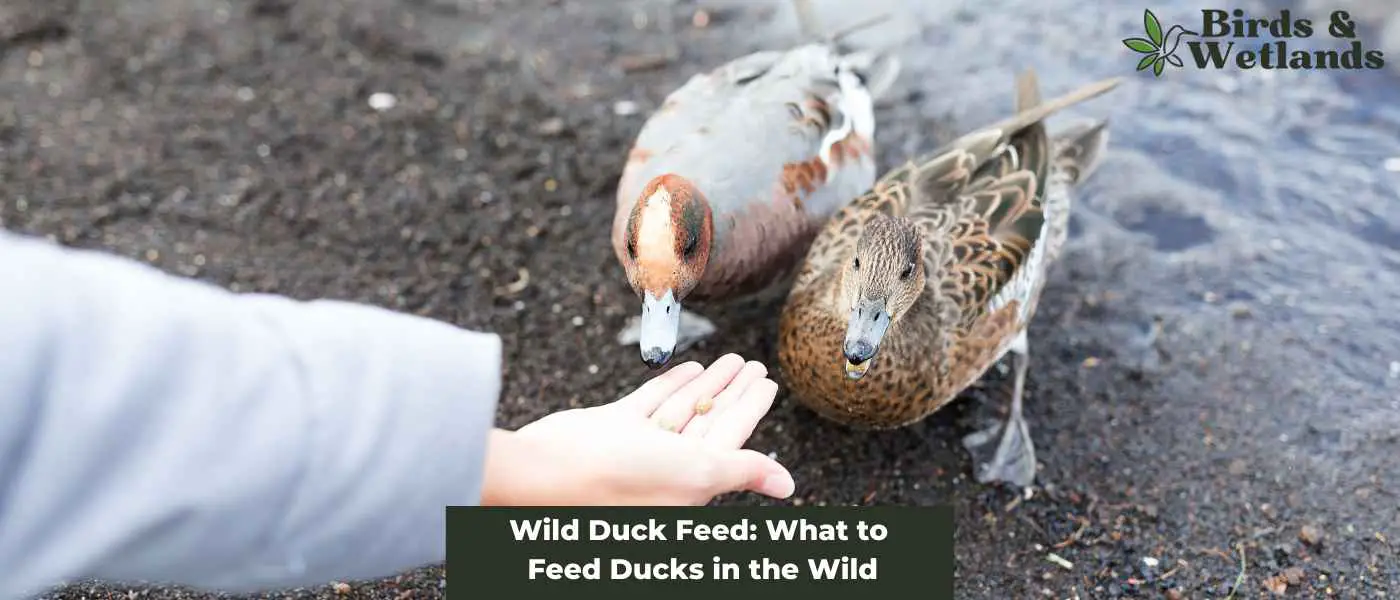Feeding wild ducks is a common activity for many people who enjoy spending time near ponds, lakes, and other bodies of water.
However, not all foods are suitable for these birds, and some can even be harmful to their health. We will explore the best foods to feed wild ducks, the foods to avoid, and the reasons behind these recommendations.
When feeding ducks in the wild, it is best to offer them nutritious and natural food options. Healthy choices include chopped leafy greens, peas, corn, oats, and seeds. Do not feed bread, as it lacks essential nutrients and can harm their digestion and contribute to water pollution. Always feed ducks responsibly, in moderation, and at designated feeding locations.
Why Feed Wild Ducks?
Feeding wild ducks is a popular activity for many people, but why do it? Here are a few reasons why feeding wild ducks can be beneficial:
1. Educational Experience
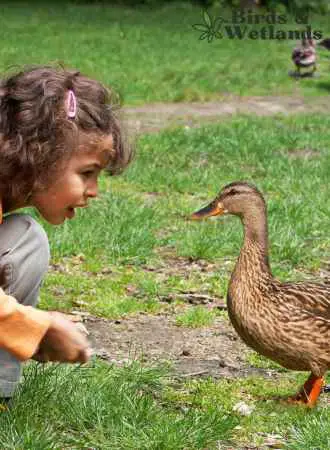
Feeding wild ducks can be a great educational experience, especially for children. It can teach them about the natural world and the importance of conservation. They can learn about the different types of ducks and their feeding habits. It can also teach them about the importance of feeding ducks the right food to keep them healthy.
2. Helps Ducks in Winter
Feeding wild ducks during the winter months can help them survive when food is scarce. During the winter, ducks have a hard time finding food, and feeding them can help them get the nutrition they need to stay healthy.
3. Brings Joy to People
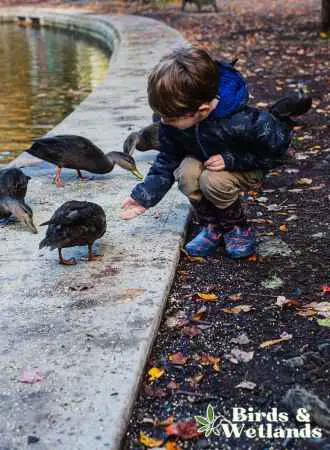
Feeding wild ducks can be a source of joy for many people. It can be a peaceful and relaxing activity that brings people closer to nature. It can also be a fun activity for families to do together.
However, it is important to remember that feeding wild ducks should be done responsibly. Overfeeding ducks can lead to health problems, and feeding them the wrong food can be harmful. It is important to feed ducks a balanced diet that includes grains, vegetables, and protein. Bread should be avoided as it is not nutritious and can cause digestive problems.
Also, consider removing any uneaten food when you feed the ducks, otherwise, it could attract unwanted pests. Always remove any little or any unsuitable or moldy scraps, as consuming moldy food can cause digestive issues, liver damage, and other health problems in ducks. Moldy food can attract unwanted pests and bacteria that can further harm the ducks.
What to Feed Wild Ducks
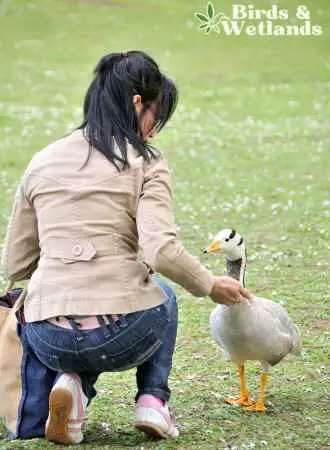
When feeding wild ducklings or ducks, it is important to provide them with a balanced diet that meets their nutritional needs. Wild ducks feed on a variety of natural foods and can also benefit from supplementary foods.
Natural Foods
Wild ducks feed on a variety of natural foods, including:
- Aquatic plants: Wild ducks feed on a variety of aquatic plants, such as duckweed, cattails, and water lilies. These plants provide essential nutrients and fiber that help maintain the ducks’ digestive health. They can also eat fish eggs.
- Invertebrates: Wild ducks also feed on a variety of invertebrates, such as insects, snails, and worms. These foods are rich in protein and other essential nutrients that help support the ducks’ growth and development.
- Grains: Wild ducks also feed on grains, such as wheat, barley, and corn. These grains provide essential carbohydrates that help fuel the ducks’ energy needs.
Supplementary Foods
In addition to natural foods, wild ducks can also benefit from supplementary foods. Some good options include:
- Cracked corn: Cracked corn is an affordable and good alternative to bread. It’s much easier for smaller birds to eat and can be found at most bird feeding stores.
- Wild bird seed: Whole organic, old-fashioned oats or wild bird seed are good options that have good nutrition and they’ll mostly float on water long enough for waterfowl to eat them.
- Lettuce: Lettuce leaves and other salad mixes vegetable trimmings can be ripped into smaller pieces and are easy for the ducks to catch and digest. Any green produce that’s available can be used.
- Vegetable trimmings or peels: Chopped vegetable trimmings or peels can be given to ducks. They are a good source of vitamins and minerals.
- Poultry starter pellets (which you can buy from animal stores as well as agricultural supply stores) are another great option to feed wild mallards and other ducks.
Manna Pro All Flock Complete Feed for Ducks

Keep Your Wild Ducks Healthy and Happy
Do you love feeding wild ducks but worry about their health and wellbeing? This specially formulated feed is designed to promote healthy digestion and overall health in gamebirds and poultry, making it the perfect choice for feeding wild ducks.
- Improved Digestion: The probiotics in this feed help to improve gut health and aid in digestion, making it easier for your birds to absorb the nutrients from their food. This can lead to improved overall health, better growth, and increased egg production.
- Enhanced Immune Function: Manna Pro Gamebirds Probiotics for Digestion contains essential vitamins and minerals that help to support immune function in your birds. This can help to keep them healthy and reduce the risk of illness and disease.
- Better Growth and Development: With its high-quality ingredients, including probiotics and essential nutrients, this feed can help to promote better growth and development in your birds. This can lead to larger, healthier birds and increased egg production.
- Convenient and Easy to Use: Manna Pro Gamebirds Probiotics for Digestion is a simple and convenient way to support the health of your birds. It can be easily added to their regular feed, and its highly palatable formula ensures that your birds will love it.
It is important to note that bread is not a suitable food for wild ducks or other waterfowl species. Bread is low in nutrients and can cause digestive problems for ducks. Additionally, feeding bread can cause them to become dependent on humans for food, which can lead to overcrowding and other problems.
Overall, when feeding wild ducks, it is important to provide them with a balanced diet that meets their nutritional needs. Natural foods like aquatic plants and invertebrates should be the primary source of food, while supplementary foods like cracked corn and lettuce can be used to supplement their diet.
Remember too much food can hurt birds and any uneaten food can attract rodents if you create excess waste.
Feeding Wild Ducks Responsibly
Feeding wild ducks can be a fun and rewarding experience, but it’s important to do so responsibly. Here are some tips to ensure that wild ducks are fed in a way that is healthy for them and their environment.
Should You Feed Wild Ducks?
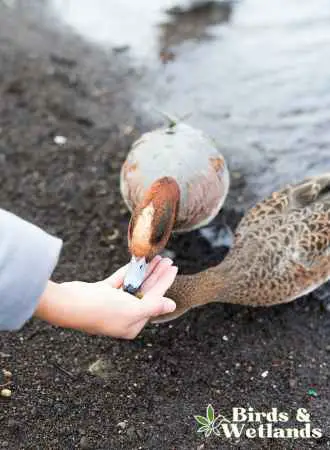
Before feeding wild ducks, it’s important to consider whether it’s necessary or not. Wild ducks have a natural diet that provides them with all the nutrients they need to survive. However, if you do decide to feed them, make sure to do so responsibly.
What to Feed Wild Ducks
When feeding wild ducks, it’s important to provide them with food that is healthy and nutritious. Here are some options for feeding wild ducks:
- Peas: Frozen peas are a great option for feeding wild ducks. They are packed with nutrients and are easy for ducks to digest.
- Lettuce: Romaine lettuce is a good option for feeding wild ducks. It is high in fiber and provides ducks with the nutrients they need to stay healthy.
- Wild Duck Feed: Specially formulated wild duck feed, such as Quack Snacks or duck feed pellets, is a great option for feeding wild ducks. This feed is designed to provide ducks with all the nutrients they need to stay healthy.
What Not to Feed Wild Ducks
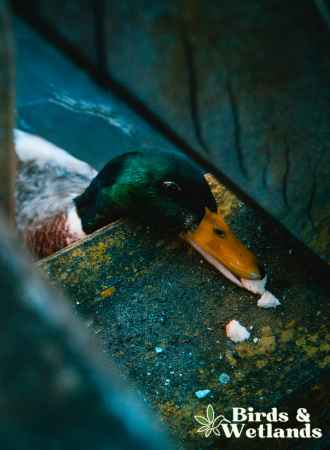
Feeding wild ducks junk food such as bread, chips, crisps, and confectionery is bad for their health. particularly young birds. These foods are low in nutrients and can cause health problems for ducks. Here are some foods to avoid when feeding wild ducks:
- Bread: Bread is a common food that people feed to ducks, but it’s not a healthy option. Bread is low in nutrients and can cause digestive problems for ducks.
- Chips and crisps: These foods are high in salt and can cause health problems for ducks.
- Confectionery: Sweets and chocolate are not suitable for ducks and can cause health problems.
Feeding Wild Ducks Responsibly
When feeding wild ducks, it’s important to do so responsibly to ensure their health and the health of their environment. Here are some tips for feeding wild ducks responsibly:
- Feed ducks in small quantities to avoid overfeeding and to prevent food from going to waste.
- Feed ducks in areas where they can forage for food naturally.
- Avoid feeding ducks in areas where there is a risk of them becoming a nuisance or causing damage.
- Clean up any leftover food to prevent litter and the attraction of unwanted animals.
By following these tips, you can ensure that wild ducks are fed in a way that is healthy for them and their environment.
Wild Duck Feeders
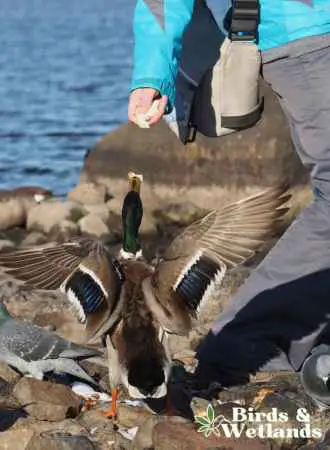
Wild duck feeders are a great way to provide food for ducks in your area without the need for human interaction. These feeders can be placed in areas where ducks are known to frequent, such as ponds or lakes. They come in various shapes and sizes, and can be made from different materials such as plastic, metal or wood.
One popular type of wild duck feeder is the automatic feeder. These feeders use a timer to dispense food at set intervals, ensuring a steady supply of food for the ducks. They are also designed to prevent food from getting wet or moldy, which can be harmful to the ducks.
Another type of wild duck feeder is the gravity feeder. These feeders use gravity to dispense food as the ducks eat, ensuring a constant supply of food. They are also easy to refill and clean, making them a popular choice among duck enthusiasts.
When choosing a wild duck feeder, it is important to consider the type of food you will be feeding the ducks. Ducks require a balanced diet of protein, carbohydrates, and fats, and should not be fed processed or junk food. Some good options include lettuce, peas, corn, and oats.
It is also important to ensure that the feeder is placed in a safe location, away from predators such as cats or dogs. Additionally, the feeder should be cleaned regularly to prevent the buildup of bacteria and mold.
Overall, wild duck feeders are a great way to provide food for ducks or other wild birds in your area while minimizing human interaction. By choosing the right feeder and food, you can help ensure the health and well-being of these beautiful birds, however, do remember to ensure that there are no rules that prohibit feeding ducks. For feeding domesticated ducks, see out guide to what to feed ducks.
Best Duck Feed Pellets
Are you a duck owner looking for the perfect feed to keep your feathered friends happy and healthy? Look no further than Purina Duck Feed Pellets! With their nutritionally balanced formula and high-quality ingredients, these pellets are the ultimate solution for providing your ducks with the nutrition they need to thrive.
Pros
- Complete Nutrition: Purina Duck Feed Pellets are nutritionally balanced to provide all the essential vitamins and minerals that ducks need to stay healthy and strong.
- Easy to Digest: The pellets are specially formulated to be easy to digest, which makes them ideal for ducks of all ages.
- Promotes Growth and Development: With its balanced nutrition formula, Purina Duck Feed Pellets are designed to support healthy growth and development in ducks.
- Suitable for All Breeds: Whether you have domestic ducks or wild ducks, Purina Duck Feed Pellets are suitable for all breeds of ducks.
- Trusted Quality: Purina has been producing high-quality animal feed for over 100 years, so you can trust that your ducks are getting the best possible nutrition with Purina Duck Feed Pellets.
Cons
- Cost: Compared to other types of duck feed on the market, Purina Duck Feed Pellets can be slightly more expensive. However, many customers feel that the high-quality ingredients and balanced nutrition formula are worth the extra investment.
- Pellet Size: Some customers have noted that the pellet size of Purina Duck Feed Pellets can be quite large, which may not be suitable for smaller or younger ducks. However, many customers have reported that the pellets can easily be broken up or soaked in water to make them easier to eat.

